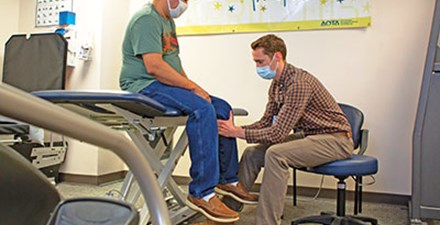APTA contributed to the development of an eight-point strategy to address a highly prevalent but "under-recognized" condition.
A revised "public health agenda" for addressing osteoarthritis couldn't make it any clearer: The impact of OA could be blunted through greater emphasis on nondrug interventions, physical activity, weight management, and a stronger embrace of evidence-based approaches and policies.
Developed through a collaborative effort between the U.S. Centers for Disease Control and Prevention, the Arthritis Foundation, and the Osteoarthritis Action Alliance, the 2020 update of the National Public Health Agenda for Osteoarthritis describes OA as "still an under-recognized chronic condition." Currently, the report states, OA is estimated to affect one in seven Americans; given growing obesity rates and an aging population, prevalence is likely to increase in the coming years.
And yet, "OA is not the inevitable result of aging, and there are public health strategies that can help to prevent and manage it," according to the report. Those strategies — eight in all — are at the heart of the OA agenda. Staff and volunteers from APTA, which is a member of the action alliance, contributed to the development of the strategies.
The eight strategies outlined in the report are:
1. Promotion of evidence-based, self-management programs and behaviors as nondrug interventions.
2. Expansion of access to self-management education and physical activity programs.
3. Promotion of low-impact, moderate-intensity physical activity for adults with OA.
4. Promotion of weight management for prevention and treatment of OA.
5. Promotion and implementation of policies and interventions that reduce falls and OA-related joint injuries.
6. Expansion of systems for referral and delivery of evidence-based interventions.
7. Assurance of equity in access and delivery of interventions.
8. Implementation of a public health policy agenda for OA.
9. Pursuit of more OA research and evaluation.
"Tackling the complex challenges of OA requires a concerted effort among multiple and diverse public and private sector partners," the report states, describing the OA Action Alliance as "uniquely positioned to coordinate the [agenda] into action."
In addition to being a member of the OA Action Alliance, APTA is a strong supporter of the importance of physical activity in the treatment of OA. The association offers resources on encouraging healthy, active lifestyles at APTA's Prevention, Wellness, and Disease Management webpage as well as information on arthritis management through community programs. Members also can dive deeper into the issues by joining APTA's Council on Prevention, Health Promotion, and Wellness in Physical Therapy. Patient-focused resources are available through APTA's ChoosePT.com website; the Osteoarthritis Action Alliance also offers a free booklet to help consumers participate in its "Walk With Ease" program.
